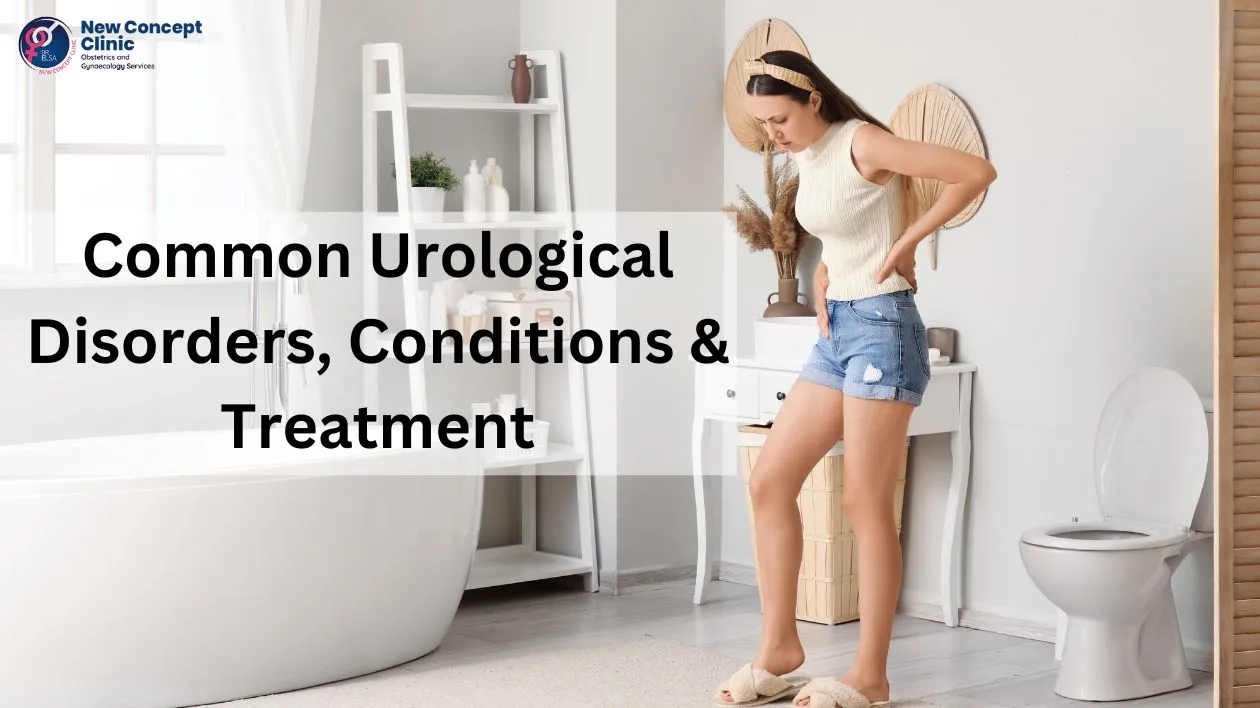

There are numerous Urological illnesses that men and women of various ages suffer from. Some are temporary, while others are long-term and difficult. Urologic disease can be treated early on; if you have any urological symptoms, there may be a problem. As a result, you must consult a Urologist for an accurate diagnosis and quick treatment.
Urological conditions influence the urinary tract system. Your urinary system includes the kidney, bladder, ureters, and urethra, which are responsible for removing waste items from the body by eliminating urine. The urinary tract must function regularly and in the proper order to remove waste from the body system.
Common symptoms that signal you should visit the top urologist in Dubai, New Concept Clinic.
Pain or burning sensation
Frequent need to urinate or difficulty urinating
Problems with urinary control or Incontinence
Severe constipation
Frequent urinary tract infections
Fertility issue
For men: difficulty attaining keeping an erection
For men: enlarged prostate
While testing is the only way to determine if you have a urological disease, we will look at some of the most common urological disorders and how to treat them.
Urinary incontinence is a widespread disorder that affects many people. Urine leakage or difficulty regulating the urge to pass urine may be symptoms of urinary incontinence.
Depending on the symptoms, urinary incontinence can be classified into many categories.
Stress incontinence
The most prevalent type of urine incontinence occurs when the pelvic muscles are weak. When the bladder is pressurized, involuntary urine leaks occur. Leaking can occur when you sneeze, cough, laugh, exercise, or bend.
Urge incontinence or Overactive bladder (OAB)
A sudden or urgent urge to urinate promptly. You may not have time to hurry to the restroom to hold your pee (urinate) and will come out unexpectedly. The bladder (which holds the urine) contracts too early, and the muscle walls' normal regulation to hold it weakens. This could be due to issues with the spinal cord or brain. However, in most situations, the cause of OAB remains unknown.
Functional incontinence
When the urinary system is working well and you can't control your urge to urinate. This could be due to unforeseen circumstances that make getting to the bathroom difficult. For when a patient has difficulties moving quickly owing to arthritis, is in bed due to injury, or has impaired mobility, leading the person to delay walking to the restroom.
Overflow incontinence (chronic urinary retention)
Failure to adequately empty your bladder results in frequent leaks. Usually caused by an obstruction or blockage in your bladder, preventing it from being completely emptied.
Total incontinence
Your bladder cannot store any pee, therefore you are continually passing it and leaking. Typically caused by a bladder issue at birth or a spinal injury.
Treatment: There are alternate and available medical therapies to alleviate your problems. In certain circumstances, doctors may propose lifestyle modifications to remedy the problem; however, if the problem persists, you may be prescribed drugs to treat your condition or surgery.
Urinary tract infections are usually caused by bacteria that infect the bladder, urethra, and, in rare cases, the kidneys. This sort of urologic disease is more common in women, although it can also afflict men. Women are more likely to develop UTIs because their urethra is adjacent to the anus, allowing bacteria to travel a shorter distance to the bladder.
Lower urinary tract infections rarely result in problems when treated quickly. However, if left untreated and the bacterial infection in the urinary system spreads to the kidneys, the patient may suffer fever and other serious problems.
Symptoms:
A burning feeling while urinating
constant want to urinate that does not go away
cloudy urine
bright pink-colored or Red urine signs of blood in urine
foul-smelling urine
Pelvic pain in the around the pubic bone area and center.
Treatment: Your doctor may offer a urine culture test to accurately assess your disease. Most UTIs can be cleared completely with antibiotics in a matter of days.
BPH is widely known as an enlarged prostate gland in males, which typically grows larger as they age. An enlarged prostate inhibits the passage of urine, making it difficult to empty the bladder. It is not directly linked to prostate cancer.
Symptoms:
You may experience a frequent or urgent need to urinate
Peeing more often at night
Difficulty peeing
A weak urine stream, or a stream that stops and starts
Feeling that the bladder is not empty after urination.
Treatment: Patients with BPH can benefit from a variety of treatments. Your doctor may decide to just monitor your illness or prescribe drugs; in extreme circumstances, you may need surgery or other operations.
A kidney stone is a crystal-like substance composed of minerals and other compounds (such as uric acid and cysteine) that collect in the kidney. The stone can develop in size and obstruct urine flow, causing substantial pain unless it is passed through the urine.
In most situations, stones can be removed through urination without the need for medical assistance or medication; nevertheless, bigger stones may require medical intervention.
Symptoms:
Severe pain in the lower abdomen, belly area, or lower back (typically on one side only)
A burning sensation or pain while urinating
Frequent urination
Fever, chills, and vomiting a sign of infection
Blood in the urine (brown, red, or pink urine color)
Smelly or cloudy urine
Feeling like you're urinating incompletely or in small amounts
Feeling queasy due to the intensity of the pain
Treatment: Depending on the severity of your stones, your doctor may advise you to drink at least 6 to 8 glasses of water to help the stones to pass through your urine.
At New Concept Clinic, we have the top Urologist in Dubai, who provides comprehensive Urological care, from first consultation and diagnosis to treatment and surgical procedures. Call now to schedule an appointment.